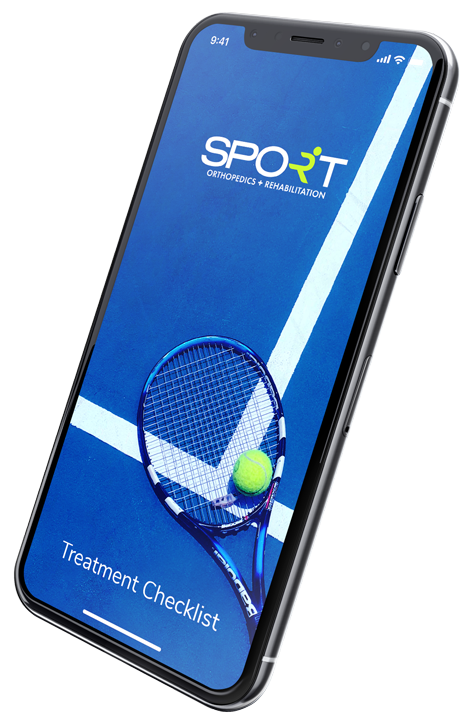Knock Knees Treatment for Children in Dallas, Frisco, Prosper, and Wylie
Knock Knees Surgery and Treatments, Genu Valgum Treatment
Our Dallas orthopedic specialists see hundreds of children with knock knees. If your child’s knock knee condition does not improve by the age of 7, consult an orthopedic specialist right away. At SPORT, we have the skills and the experience to correct knock knees for young patients early on. This helps to prevent cosmetic and mobility problems developing over the years and into adulthood. To schedule a consultation about your child’s knock knees, please call our office at 469-200-2832 today.
Dallas Knock Knees Specialist
What Are Knock Knees, or Genu Valgum?
“Knock knees,” also called genu valgum, is an abnormal alignment of the legs in which the legs curve in toward the knee. This condition often does not allow one’s ankles to come together without shifting one leg or the other. To say that this is an “abnormal” alignment of the legs, it is important to understand first what “normal” alignment is.
With normal alignment of the legs, the centers of the hips, knees, and ankles form a straight line downward. If this line from the hips to the ankles runs outside the knee, this is knock knees, also called inverted knees. Many times, toddlers who have inverted knees will outgrow them as they age. Sometimes, however, surgery is necessary to correct the problem.
Inverted knees in children generally do not improve with time. Rather, they worsen with arthritis and joint degeneration, sometimes resulting in knee replacement surgery. SPORT Orthopedics + Physical Therapy has corrected this problem many times in children with top-of-the-line therapeutic and surgical techniques. If your little one is suffering with knock knees, visit SPORT Orthopedics in Dallas and Frisco for your personalized treatment plan.
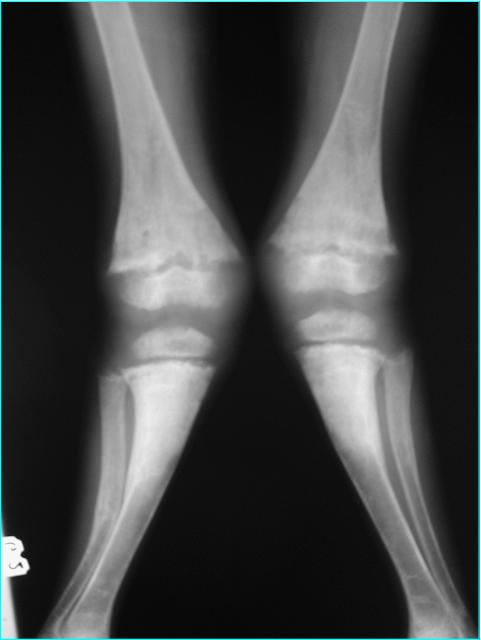
Genu Varum vs Genu Valgum
Genu varum and genu valgum are two types of knee deformities. Genu varum, also known as bow-leggedness, is characterized by outwardly curved legs that cause the knees to stay wide apart when the feet are together. Genu valgum, commonly referred to as normal knock-knees, is a condition where the knees angle in and touch each other when the legs are straightened. Both can result in knee pain.
What Are Symptoms of Knock Knees?
Someone with knock knees will stand with their knees together, and their lower legs are abnormally far apart. Small distance between the ankles is normal, but for people with knock knees, the gap could be over 3 inches wide. While this condition does not normally cause major problems, severe cases cause pain in the knees, limping, or even difficulty walking. If the condition does not improve over time (which is only possible in young children), the risk of developing arthritis will increase.
Sometimes, there is a greater cause for seeking medical advice. If your child experienced any of the below symptoms, we recommend seeking medical advice right away.
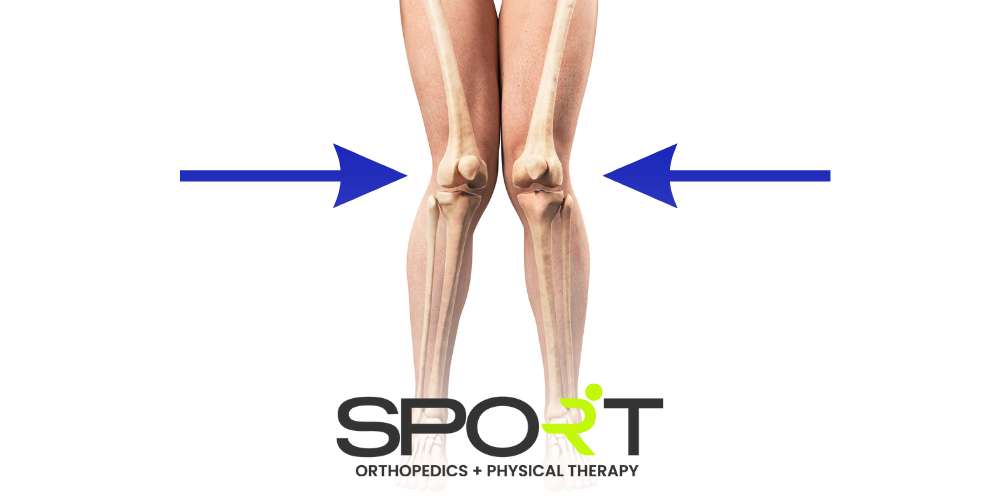
- The ankle gap is greater than 8 centimeters while the knees are together
- The problem is worsening
- Your child has knock knees before the age of 2, or after the age of 7
- Only one leg seems affected
- There are symptoms such as pain or difficulty walking
- The knock knees have not improved, and your child is nearing adulthood
- Knee instability
What Causes Knock Knees?
There are different causes for knock knees in children. Children sometimes develop inverted knees normally between ages three to four. They are not an uncommon occurrence, and most toddlers will outgrow it. In these cases, there is no known cause for knock knees, meaning the cause is idiopathic. Knock knees in children are also caused by different types of rickets, which we detail below.
- Renal rickets: This is related to either kidney failure or renal osteodystrophy, which is a failure of the kidneys to keep proper levels of phosphorus and calcium in your blood that leads to bone disease.
- Hypophosphatemic rickets: This is vitamin D-resistant rickets.
- Nutritional rickets: Rickets caused by vitamin D or other nutritional deficiencies.
In adults, knock knees often result from untreated pediatric orthopedic issues. They can also be caused by physical trauma to the legs or knees, as well as infection or arthritis.
How Are Knock Knees Diagnosed?
During your appointment, our Dallas orthopedic specialists will first examine the physical appearance of your child’s legs and knees. While the child stands upright, we will examine whether their knees touch while there is a wide space between their ankles. If this is the case, we will order an X-ray, and draw a line from their hips to their ankles. As stated above, if this line passes outside of their knee, they have knock knees.
When examining children, we examine the quality of their bones, as well as the width of their growth plates. Growth plates are responsible for the lengthening of their limbs as they age. If the child has a nutritional deficiency, especially a vitamin D deficiency, they will often have irregular growth plates. This presents alongside knock knees. If we suspect nutritional deficiencies, we will order a blood test to confirm which condition is causing the child’s knock knees.
Knock Knee Test
The knock knee test, also known as the valgus stress test, is a physical examination maneuver used to assess the integrity of the medial collateral ligament (MCL) of the knee. During the test, the examiner applies a valgus force by pushing the knee outward while stabilizing the thigh and ankle.
This maneuver aims to evaluate if there is excessive movement or pain indicative of MCL injury or laxity. If so, we can determine a pediatric physical diagnosis of mild or severe knock knees. If you think your child may be knock-kneed, this is the first diagnostic test we would employ to determine that.
Can You Fix Knock Knees in Children or Adults?
Most children can outgrow knock knees over time as their bones develop. However, for severe cases, we are often able to treat knock knees with bracing, corrective shoes, physical therapy, or surgery. It is sometimes possible to treat knock knees in adults, but it is usually much more difficult. SPORT Orthopedics + Physical Therapy specializes in treating knock knees in children rather than adults.
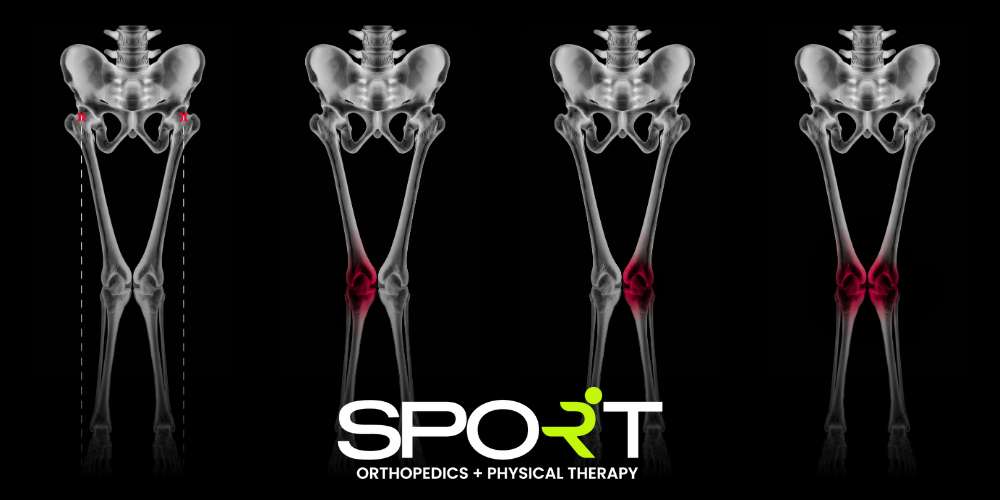
How to Fix Knock Knees in Children
Our main goals in treating this condition are to align the limbs normally, stop the progression of knock knees, and reduce the risk of degeneration in the child’s joints. Children may present with knock knees in their toddler years, but they often grow out of the condition with time. Unfortunately, this is not always the case. In pediatric cases where the child has irregular X-rays or blood test results, we will recommend special treatment.
Knock Knees Treatment for Child Patients
If the inverted knees are the result of nutritional deficiencies, we often recommend supplements or replacements to correct the problem. When this proves unsuccessful in straightening the legs, we may discuss surgical correction. In children who are still growing, we perform minimally invasive surgeries which correct the growth of the legs.
Over a period of 6 to 18 months, the growth of the legs is corrected with the help of staples, plates, or screws along the growth plates. Most times, we recommend minimal physical therapy in Frisco and Dallas after surgery.
How to Fix Knock Knees in Children Without Surgery
In most children, mild cases often correct themselves as they grow, the bones develop, and the legs begin to straighten. For more severe or persistent cases, especially if they affect walking or cause pain, orthopedic interventions such as a night brace or corrective shoes may be prescribed to help the legs straighten. The method of treatment may vary depending on leg lengths, whether only one leg or both legs are affected, and much more.
Knock Knee Surgery in Dallas
Generally, osteotomy surgery is performed for severe or persistent cases of knock knees in children. During osteotomy, Dr. Berry makes controlled cuts in the bone to realign the knee joint, correcting the deformity. While complications are extremely rare, they can include bone infection, blood clots, nerve injury, healing issues, and more.
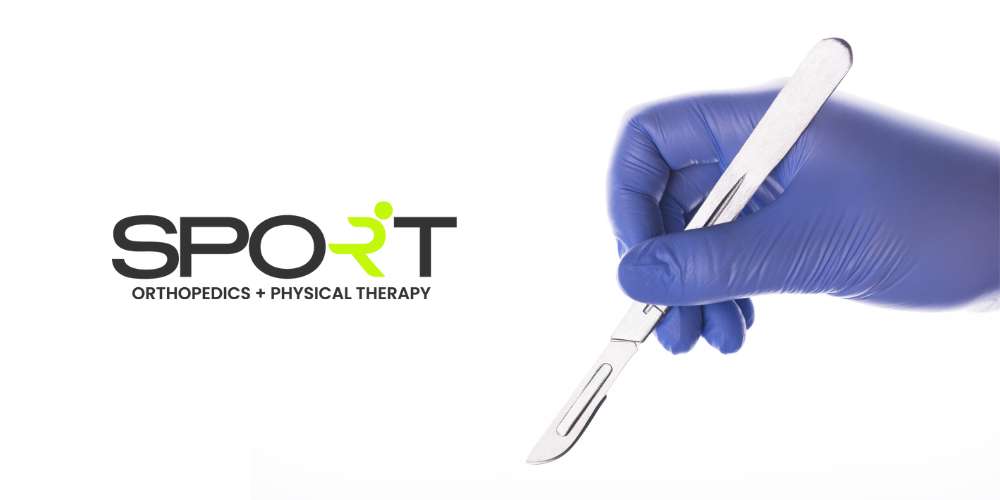
Knock Knee Surgery Recovery Time
Recovery time can vary but generally involves several weeks to months of rehabilitation, focusing on physical therapy to regain strength and mobility. Most young children recover within 4 to 6 weeks.
Knock Knee Surgery Cost
The cost of knock knee surgery can also vary widely depending on factors such as the surgeon’s expertise, hospital fees, and geographic location. It often includes expenses for preoperative consultations, surgery itself, anesthesia, hospital stay, and post-operative care. We recommend speaking with Dr. Berry for a thorough understanding of the potential cost of the surgery.
Which Knock Knee Treatment Is Right For Me?
At SPORT, we identify the source of your child’s pain and then use top-of-the-line therapeutic techniques to restore their range of motion, as well as their quality of life. Depending on their specific condition and its severity, we develop personally-curated treatment plans. These plans may include physical therapy, medication, shots, or even surgery.
If your child has knock knees, you may want to seek medical attention right away. The longer you wait, the worse the condition will get. Call SPORT at (469) 200-2832 to schedule a consultation, or fill out our online intake form.
Call SPORT Orthopedics + Physical Therapy for Knock Knee Treatment in Dallas, Frisco, Prosper, and Wylie
At SPORT, we identify the source of your child’s pain and then use top-of-the-line therapeutic techniques to restore their range of motion, as well as their quality of life. Depending on their specific condition and its severity, we develop personally-curated treatment plans. These plans may include physical therapy, medication, shots, or even surgery. The surgeons at our practice have extensive experience with various types of surgery, including knee arthroscopy, rotator cuff repair, hip replacements, and many more.
If your child has knock knees, seek medical attention right away. The longer you wait, the worse the condition will get. Call SPORT Orthopedics + Physical Therapy at (469) 200-2832 to schedule a consultation, or fill out our online intake form.


